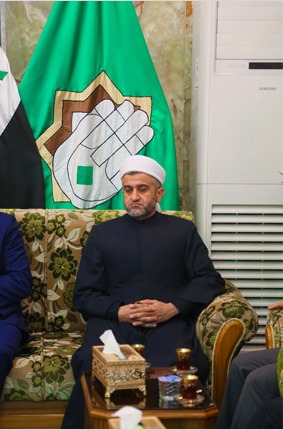
RNA – Shaykh Fakhir Abbas Isa al-Dawoudi, the imam of the mosque of the city of Tuz Khurmatu in Iraq’s Salahuddin governorate, has visited the Holy Shrine of Imam al-Husayn in Karbala where he met with officials for dialogue.
In an interview with reporters, the Sunni cleric referred to the “obligatory jihad” fatwa issued by Grand Ayatollah Sayyid Ali al-Sistani in June 2014, in which the Shi’ah religious authority called on all Iraqi citizens to defend the country, its people, the honour of its citizens, and its sacred sites, and said “This fatwa led to unity and resistance against the Daesh Takfiri phenomenon and defence of the country’s sacred sites and territory.”
Shaykh al-Dawoudi said, “We consider any recommendation and command made by Ayatollah al-Sistani as valuable because this source of emulation has protected the territory and blood of the Iraqi people.”
He said that if it wasn’t for the Popular Mobilization Forces, today Iraq would be completely in the hands of Daesh and added that Popular Mobilization Forces have offered many martyrs in defence of the Iraqi nation and is innocent of all the rumours and lies that the enemies have spread.
The Popular Mobilization Forces have repeatedly been accused of committing war crimes and human rights abuses against Sunni residents of areas recaptured from Daesh.
The imam of Tuz Khurmatu noted that much blood that has been shed toward the defense and liberation of Iraq from the clutches of the Takfiri terrorist phenomenon reminds of the tragedy of Karbala and the martyrdom of Imam al-Husayn.
Shaykh al-Dawoudi stressed that the Sunnis have always supported Ayatollah al-Sistani and will always stand with the revered source of emulation against terrorism.
112/930/278